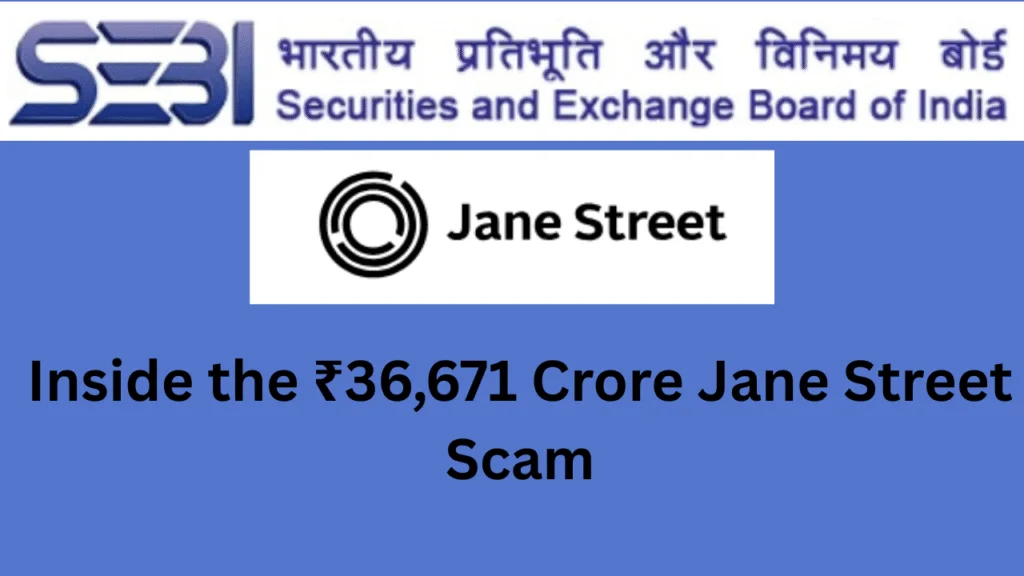
On July 3, 2025, the Securities and Exchange Board of India (SEBI) issued a powerful interim order against Jane Street Group, one of the world’s most prominent proprietary trading firms. In a rare regulatory move, SEBI accused the firm of manipulating Indian financial markets — specifically the BANKNIFTY index and related options — across a span of two years, from January 2023 to March 2025.
This unprecedented crackdown shook the confidence of Indian markets. Share prices of key intermediaries like Angel One, BSE, and Nuvama dropped in reaction. The case is not just about one firm’s misconduct — it’s a statement about SEBI’s readiness to act against sophisticated manipulation in the age of high-frequency algorithmic trading.
This article is a full, detailed breakdown of the Jane Street SEBI case . We’ll explore the background, the firms involved, the manipulation strategies uncovered, and what this means for the future of market regulation in India.
Background: Why Did SEBI Start Investigating Jane Street?
In early 2024, media reports began surfacing about a legal conflict involving Jane Street and a former employee. That case centered on allegations of proprietary trading strategies being copied and used in Indian markets. This caught the attention of SEBI, which then began a discreet internal examination of Jane Street’s activities.
In April 2024, SEBI officially initiated a fact-finding mission. They noticed something peculiar — on several key trading days, the BANKNIFTY index exhibited strange intraday movements. Specifically, there was a pattern of the index rising sharply in the morning, followed by a drop later in the day — all without corresponding fundamental triggers.
To investigate, SEBI turned to the National Stock Exchange (NSE) on July 23, 2024. NSE was asked to provide data and analysis on Jane Street’s trades. By August 2024, Jane Street responded with written explanations, but SEBI found the responses evasive and lacking in transparency.
Over the following months, NSE submitted detailed reports showing abnormal trading volumes, timing mismatches, and patterns of manipulation. These findings laid the foundation for SEBI’s formal action.
Entities Named in SEBI’s Interim Order
The order named four key Jane Street-linked entities involved in this alleged manipulation:
- JSI Investments Pvt. Ltd. (Indian registered company)
- JSI2 Investments Pvt. Ltd. (Indian registered company)
- Jane Street Singapore Pte. Ltd. (Registered FPI)
- Jane Street Asia Trading Ltd. (Hong Kong-based FPI)
Collectively, these four entities carried out large trades in the Indian stock and derivatives market. Their trading behavior, especially around expiry dates, raised serious red flags. These weren’t just large positions — they were intelligently timed, systematically planned trades that appeared to push the market in a direction favorable to their option books.
The Core Trading Strategy: Manipulating the Index
SEBI described two major strategies that Jane Street used to allegedly manipulate the market:
1. Intra-day Index Manipulation Strategy
Let’s take January 17, 2024, as a case study.
Morning Phase:
- BANKNIFTY opened weak due to HDFC Bank’s poor quarterly results.
- Jane Street entities aggressively bought BANKNIFTY heavyweights — HDFC Bank, ICICI Bank, Kotak, Axis — in both the cash and futures segments.
- This intense buying lifted the BANKNIFTY index by over 200 points between 9:15 AM and 11:47 AM — an artificial recovery not backed by market sentiment.
Simultaneously:
- Jane Street opened large bearish positions in options:
- Bought ATM and OTM puts
- Sold ATM and OTM calls
Later in the Day:
- Between 11:47 AM and 3:00 PM, Jane Street offloaded the earlier accumulated long positions.
- This sell-off caused the index to fall again, sometimes by as much as 300 points.
- The earlier bearish options positions became highly profitable.
SEBI confirmed that 15 out of 18 expiry days during the review period showed similar patterns.
2. Extended Marking the Close Strategy
In a few cases (May 2025, for instance), Jane Street executed large trades in the final 30 minutes of the trading day. This was done to influence the closing value of the index, which is critical for the settlement of options.
Such manipulation of closing values — especially on weekly and monthly expiry days — can dramatically boost profits for those with pre-set positions. This strategy, known in the financial world as “marking the close”, is illegal under SEBI regulations.
Magnitude of Gains and Market Damage
According to SEBI, the scale of manipulation was vast:
- Total profits (Jan 2023 – Mar 2025): ₹36,502 crore
- Index options profit alone: ₹43,289 crore
- Losses in stock/futures trades: ₹7,687 crore (used as a cover)
One single day — January 17, 2024 — saw Jane Street make ₹734.93 crore in profit from these trades.
Importantly, SEBI noted that the directional exposure of these trades did not match normal hedging or arbitrage strategies. The sheer volume, precision, and repetitive nature all pointed toward manipulation — not investment.
Laws Allegedly Violated By Jane Street
SEBI found Jane Street guilty of breaching multiple laws:
- Section 12A of SEBI Act: Prohibits use of manipulative and fraudulent devices.
- Regulation 3 of PFUTP: Bans fraudulent dealing in securities.
- Regulation 4 of PFUTP: Forbids manipulating price or volume.
- Code of Conduct for FPIs: Mandates fair and non-disruptive trading.
SEBI emphasized that this manipulation hurt retail investors the most. Its earlier study had shown 93% of retail F&O traders lost money between FY21 and FY23. Jane Street’s actions could have further exacerbated this trend.
SEBI’s Interim Measures Against Jane Street
On July 3, 2025, SEBI issued a sweeping interim ex-parte order, meaning the action was taken without waiting for Jane Street’s final response, due to the urgency and seriousness of the case. These were the specific directives outlined in the order:
1. Trading Ban
SEBI prohibited the following four entities from accessing India’s securities markets:
- JSI Investments Pvt. Ltd.
- JSI2 Investments Pvt. Ltd.
- Jane Street Singapore Pte. Ltd.
- Jane Street Asia Trading Ltd.
The ban applied to all forms of trading — equity, futures, options, and participation in any market infrastructure institutions. This ban will remain until a final order is passed.
2. Disgorgement of Gains
SEBI ordered the firms to deposit ₹4,843 crore — the estimated unlawful gains from the manipulation — into an escrow account within 15 days. This amount was based on partial analysis and may increase upon final assessment.
3. Asset Disclosure
The entities were directed to submit a full inventory of their bank, demat, and trading accounts, both in India and globally. This includes details of all movable and immovable assets.
4. Freezing of Bank and Trading Accounts
SEBI instructed banks and depositories to freeze account debits for the named entities without prior approval from SEBI. This ensures no siphoning or transfer of potentially illicit profits.
5. Increased Monitoring by Exchanges
NSE, BSE, and clearing corporations were advised to increase scrutiny on all derivative trades and to flag any unusual patterns immediately to SEBI.
These actions sent a clear message: no entity — foreign or domestic — is above India’s market laws.
Market Impact: Stocks That Fell After the Order
The interim order’s announcement triggered a sharp reaction in Indian stock markets, especially in stocks related to trading and brokerage infrastructure.
Angel One
Angel One is one of India’s largest digital brokerages. It generates substantial revenue from F&O brokerage fees.
- Following the SEBI order, Angel One’s share price fell nearly 6%.
- Investors feared a decline in trading volumes, particularly in index options.
- Analysts also flagged increased regulatory risks in the segment that drives most of Angel One’s revenue.
BSE (Bombay Stock Exchange)
BSE’s stock price fell due to concerns that algorithmic and foreign investor activity may decline.
- A significant portion of BSE’s earnings come from transaction-based fees.
- Lower activity in options could reduce exchange income.
- Additionally, investors worried about loss of institutional trust and longer-term tightening of SEBI oversight.
Nuvama (formerly Edelweiss Securities)
Nuvama caters heavily to institutional and HFT clients.
- With SEBI tightening its grip on manipulative strategies, firms like Nuvama face business risk.
- Its stock price dropped as investors priced in potential compliance costs and client churn.
Reactions Across the Ecosystem
From Jane Street
Jane Street denied the charges. The firm said it operates within the law and uses quantitative models that are globally compliant.
In its response to the show cause notice, Jane Street claimed:
- It followed hedging and arbitrage strategies.
- Its actions did not distort the market.
- The trades reflected normal market behavior during high volatility periods.
However, SEBI’s forensic analysis contradicted these claims. It argued that the trade size, timing, and outcomes all pointed toward intentional manipulation.
Institutional and Foreign Investors
Other global funds and algorithmic traders expressed concern. Many are now:
- Reviewing their India operations.
- Reconsidering aggressive F&O strategies.
- Consulting with legal teams to understand the implications.
Some fear a regulatory overreach, while others welcome the move as a sign of SEBI enforcing market fairness.
Market Analysts
Views are mixed:
- Pro-Regulation Analysts argue that this builds investor confidence in the long run. Retail investors often lack protection, and this action could restore trust.
- Skeptical Analysts worry about chilling effects. They suggest that SEBI must balance enforcement with market openness.
Global Implications
For Jane Street
- While Jane Street is not publicly listed, it is widely known for its ETF arbitrage and HFT dominance.
- The India ban tarnishes its brand in global trading circles.
- Regulators in the U.S., UK, Singapore, and Hong Kong may now examine its trading practices more closely.
For Emerging Markets
SEBI’s crackdown could become a blueprint for other regulators.
- Brazil, Indonesia, and South Africa have all been exploring ways to curb predatory algos.
- India may now be seen as a regulatory pioneer in developing markets.
SEBI New Regulatory Direction
SEBI’s recent actions reflect a shift in its approach:
- 2024: SEBI implemented rules discouraging excessive speculative trading in options.
- 2025: The Jane Street action is part of a broader algorithmic surveillance initiative.
We may now see:
- Mandatory algorithm disclosures for HFT firms.
- Real-time surveillance of F&O positions.
- New rules around order-to-trade ratios and quote stuffing.
SEBI may also push for a code of conduct for algos, including audit trails and machine-readable compliance protocols.
What’s Next?
SEBI’s Final Order
- SEBI will now conduct hearings.
- Jane Street can respond with legal representations.
- A final order is expected by Q4 2025.
Outcomes could include:
- Permanent ban from Indian markets.
- Escalation to criminal proceedings under the SEBI Act.
- Coordinated action with global regulators.
Impact on Derivatives Trading
In the short term:
- Volumes in weekly options may drop.
- Retail and HFT activity may slow.
In the long term:
- Market depth may improve as predatory practices are reduced.
- Retail investors could regain confidence.
Summary Table: Final Impacts
| Stakeholder | Key Outcome |
|---|---|
| Jane Street Group | Banned, ₹4,843 crore impounded, global scrutiny |
| Angel One | Stock down, revenue risk from F&O |
| BSE | Share price hit, potential drop in institutional flow |
| Nuvama | Risk of institutional client slowdown |
| SEBI | Stronger regulatory credibility |
| Retail Traders | Better protection, fairer markets |
| Foreign Investors | Increased compliance scrutiny |
Final Thoughts
The Jane Street SEBI case will likely become a case study for future financial regulation in India and abroad. It illustrates the clash between advanced algorithmic strategies and regulatory safeguards.
While Jane Street maintains that its practices are legitimate, SEBI has shown it is willing to take on even the biggest global firms to protect Indian investors.
The fallout from this case will be closely watched. Whether Jane Street is eventually cleared or permanently banned, one thing is clear: Indian markets are evolving — and so is the strength of their watchdog.

